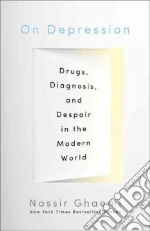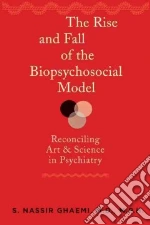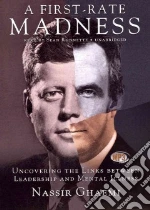 Libri di Nassir Ghaemi su Unilibro.it
)
Libri di Nassir Ghaemi su Unilibro.it
)
|
|
2025 |
 Title :
Una straordinaria follia. Storie di disturbi mentali dietro a grandi leader
Title :
Una straordinaria follia. Storie di disturbi mentali dietro a grandi leaderAuthor: Ghaemi Nassir Publisher: Apogeo "Una straordinaria follia" prende spunto dalle carriere e dalle vicende personali di importanti leader come Lincoln, Churchill, Gandhi, Martin Luther King Jr., JFK e altri degli ultimi due secoli per costruire un'argomentazione allo stesso tempo controversa e convincente: le stesse qualità che contraddistinguono le persone affette da disturbi dell'umore - realismo, empatia, resilienza e creatività - sono anche quelle che, nei momenti di crisi, rendono i leader migliori. Prendendo in esame Lincoln e Churchill, per esempio, Ghaemi mostra come il loro realismo depressivo li abbia aiutati ad affrontare complesse sfide sia personali che nazionali. Guardando, invece, al generale Sherman e al magnate della TV americana Ted Turner è la creatività, una qualità a fondo studiata dagli psichiatri in relazione al disturbo bipolare, a essere la fonte delle loro strategie più innovative e di successo. Combinando una solida analisi delle prove storiche con recenti ricerche psichiatriche, Ghaemi spiega persino perché uomini "normali" come Neville Chamberlain e George W. Bush siano stati dei pessimi leader e chiarisce anche quali tipi di follia, come la psicosi, sono alle volte causa di dispotismo e inettitudine su larga scala. Una prospettiva audace e autorevole che offre nuovi strumenti per determinare chi dovrebbe guidarci, ma soprattutto che ci incoraggia a ripensare la nostra visione della malattia mentale come un fenomeno puramente negativo, perché i tipi più comuni di follia possono conferire benefici vitali agli individui e alla società nel suo complesso, per quanto alto sia il prezz € 25,00
Scontato: € 23,75
|
|
|
1919 |
 Title :
Clinical Psychopharmacology
Title :
Clinical PsychopharmacologyAuthor: Ghaemi Nassir Publisher: Oxford Univ Pr € 102,60
|
|
|
1913 |
 Title :
On Depression
Title :
On DepressionAuthor: Ghaemi Nassir Publisher: Johns Hopkins Univ Pr In a culture obsessed with youth, financial success, and achieving happiness, is it possible to live an authentic, meaningful life? Nassir Ghaemi, director of the Mood Disorder Program at Tufts Medical Center, reflects on our society's current quest for happiness and rejection of any emotion resembling sadness. On Depression asks readers to consider the benefits of despair and the foibles of an unexamined life. Too often depression as disease is mistreated or not treated at all. Ghaemi warns against the "pretenders" who confuse our understanding of depression—both those who deny disease and those who use psychiatric diagnosis "pragmatically" or unscientifically. But experiencing sadness, even depression, can also have benefits. Ghaemi asserts that we can create a "narrative of ourselves such that we know and accept who we are," leading to a deeper, lasting level of contentment and a more satisfying personal and public life. Depression is complex, and we need guides to help us understand it, guides who comprehend it existentially as part of normal human experience and clinically as sometimes needing the right kind of treatment, including medications. Ghaemi discusses these guides in detail, thinkers like Viktor Frankl, Rollo May, Karl Jaspers, and Leston Havens, among others. On Depression combines examples from philosophy and the history of medicine with psychiatric principles informed by the author's clinical experience with people who struggle with mental illness. He has seen great achievements arise from great suffering and feels that understanding depression can provide important insights into happiness. € 25,20
|
|
|
1912 |
 Title :
The Rise and Fall of the Biopsychosocial Model
Title :
The Rise and Fall of the Biopsychosocial ModelAuthor: Ghaemi S. Nassir M.D. Publisher: Johns Hopkins Univ Pr This is the first book-length historical critique of psychiatry’s mainstream ideology, the biopsychosocial (BPS) model. Developed in the twentieth century as an outgrowth of psychosomatic medicine, the biopsychosocial model is seen as an antidote to the constraints of the medical model of psychiatry. Nassir Ghaemi details the origins and evolution of the BPS model and explains how, where, and why it fails to live up to its promises. He analyzes the works of its founders, George Engel and Roy Grinker Sr., traces its rise in acceptance, and discusses its relation to the thought of William Osler and Karl Jaspers. In assessing the biopsychosocial model, Ghaemi provides a philosophically grounded evaluation of the concept of mental illness and the relation between evidence-based medicine and psychiatry. He argues that psychiatry's conceptual core is eclecticism, which in the face of too much freedom paradoxically leads many of its adherents to enact their own dogmas. Throughout, he makes the case for a new paradigm of medical humanism and method-based psychiatry that is consistent with modern science while incorporating humanistic aspects of the art of medicine. Ghaemi shows how the historical role of the BPS model as a reaction to biomedical reductionism is coming to an end and urges colleagues in the field to embrace other, less-eclectic perspectives. € 29,30
|
 Title :
A First-Rate Madness
Title :
A First-Rate MadnessAuthor: Ghaemi Nassir Publisher: Penguin Group USA An investigation into the surprisingly deep correlation between mental illness and successful leadership, as seen through some of history's greatest politicians, generals, and businesspeople. "A First-Rate Madness," Nassir Ghaemi, who runs the Mood Disorders Program at Tufts University Medical Center, draws from the careers and personal plights of such notable leaders as Lincoln, Churchill, Gandhi, Martin Luther King, Jr., JFK, and others from the past two centuries to build an argument at once controversial and compelling: the very qualities that mark those with mood disorders- realism, empathy, resilience, and creativity-also make for the best leaders in times of crisis. By combining astute analysis of the historical evidence with the latest psychiatric research, Ghaemi demonstrates how these qualities have produced brilliant leadership under the toughest circumstances. Take realism, for instance: study after study has shown that those suffering depression are better than "normal" people at assessing current threats and predicting future outcomes. Looking at Lincoln and Churchill among others, Ghaemi shows how depressive realism helped these men tackle challenges both personal and national. Or consider creativity, a quality psychiatrists have studied extensively in relation to bipolar disorder. € 16,10
|
|
1911 |
 Title :
A First-Rate Madness (CD Audiobook)
Title :
A First-Rate Madness (CD Audiobook)Author: Ghaemi Nassir, Runnette Sean (NRT) Publisher: Blackstone Audio Inc An investigation into the correlation between mental illness and successful leadership reveals the disorders of notable leaders and explains how their struggles enabled them to empathize, recognize threats, and respond appropriately during times of crisis. € 67,80
|
 Title :
A First-Rate Madness (CD Audiobook)
Title :
A First-Rate Madness (CD Audiobook)Author: Ghaemi Nassir, Runnette Sean (NRT) Publisher: Blackstone Audio Inc An investigation into the correlation between mental illness and successful leadership reveals the disorders of notable leaders and explains how their struggles enabled them to empathize, recognize threats, and respond appropriately during times of crisis. € 27,70
|
 Title :
A First-Rate Madness (CD Audiobook)
Title :
A First-Rate Madness (CD Audiobook)Author: Ghaemi Nassir, Runnette Sean (NRT) Publisher: Blackstone Audio Inc An investigation into the correlation between mental illness and successful leadership reveals the disorders of notable leaders and explains how their struggles enabled them to empathize, recognize threats, and respond appropriately during times of crisis. € 27,70
|
|
2009 |
 Title :
A Clinician's Guide to Statistics and Epidemiology in Mental Health
Title :
A Clinician's Guide to Statistics and Epidemiology in Mental HealthAuthor: Ghaemi S. Nassir Publisher: Cambridge Univ Pr Accessible and clinically relevant, A Clinician's Guide to Statistics and Epidemiology in Mental Health describes statistical concepts in plain English with minimal mathematical content, making it perfect for the busy health professional. Using clear language in favour of complex terminology, limitations of statistical techniques are emphasized, as well as the importance of interpretation - as opposed to 'number-crunching' - in analysis. Uniquely for a text of this kind, there is extensive coverage of causation and the conceptual, philosophical and political factors involved, with forthright discussion of the pharmaceutical industry's role in psychiatric research. By creating a greater understanding of the world of research, this book empowers health professionals to make their own judgments on which statistics to believe - and why. € 51,40
|
|
|
2007 |
 Title :
Mood Disorders
Title :
Mood DisordersAuthor: Ghaemi S. Nassir Publisher: LIPPINCOTT WILLIAMS & WILKINS Thoroughly updated for its Second Edition, this practical guide will aid residents and clinicians in diagnosing and treating the full spectrum of mood disorders. Using the conversational style and clinical vignettes found in all Practical Guides in Psychiatry titles, Dr. Ghaemi explains how to accurately diagnose unipolar depression and bipolar disorder and offers specific, detailed, evidence-based recommendations on pharmacotherapy and psychotherapy. Chapters review the pharmacology of all antidepressants, mood stabilizers, and antipsychotics in current use and point out these drugs' advantages and drawbacks in specific clinical situations. Other chapters address clinical problems such as depression, mania, and ADHD in children and the conundrum of schizoaffective disorder. The Practical Guides in Psychiatry series provides quick, concise information for professionals on the front lines of mental health care. Written in an easy-to-read, conversational style, these invaluable resources take you through each step of the psychiatric care process, delivering fast facts and helpful strategies that help you provide effective and compassionate care to your patients. € 68,40
|
 Title :
The Concepts of Psychiatry
Title :
The Concepts of PsychiatryAuthor: Ghaemi S. Nassir, McHugh Paul R. (FRW) Publisher: Johns Hopkins Univ Pr Because most psychiatric illnesses are complex phenomena, no single method or approach is sufficient to explain them or the experiences of persons who suffer from them. In The Concepts of Psychiatry S. Nassir Ghaemi, M.D. argues that the discipline of psychiatry can therefore be understood best from a pluralistic perspective. Grounding his approach in the works of Paul McHugh, Phillip Slavney, Leston Havens, and others, Ghaemi incorporates a more explicitly philosophical discussion of the strengths of a pluralistic model and the weaknesses of other approaches, such as biological or psychoanalytic theories, the biopsychosocial model, or eclecticism. Ghaemi's methodology is twofold: on the one hand, he applies philosophical ideas, such as utilitarian versus duty-based ethical models, to psychiatric practice. On the other hand, he subjects clinical psychiatric phenomena, such as psychosis or the Kraepelin nosology, to a conceptual analysis that is philosophically informed. This book will be of interest to professionals and students in psychiatry, as well as psychologists, social workers, philosophers, and general readers who are interested in understanding the field of psychiatry and its practices at a conceptual level. € 28,10
|